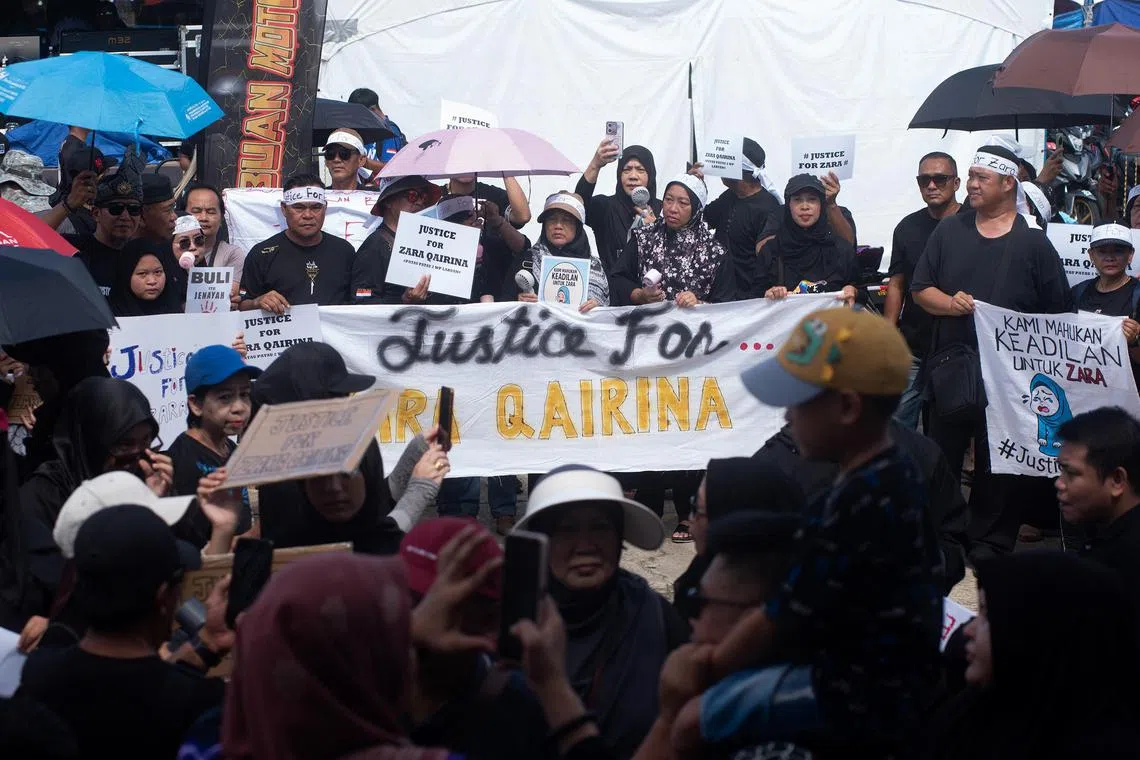Death of student in Sabah raises hurdle for Malaysian PM Anwar as he faces tough state polls soon
Sign up now: Get insights on the biggest stories in Malaysia

More than 3,000 people turned up on Aug 10 for a solidarity rally at the Labuan Food Court carpark to demand justice for Sabah student Zara Qairina Mahathir.
PHOTO: BERNAMA
Follow topic:
- Zara Qairina Mahathir, a 13-year-old student, died tragically on July 17, sparking national outrage and accusations of a cover-up by the authorities.
- The authorities exhumed Zara's remains on Aug 10 for a post-mortem after public pressure. Protests occurred across Sabah, with thousands demanding justice, influencing the upcoming state election.
- Malaysian PM Anwar's coalition faces challenges due to the incident, potentially impacting Sabah's political landscape and requiring a swift, transparent investigation to maintain credibility.
AI generated
KUALA LUMPUR – The tragic death of a 13-year-old Sabah student on July 17 has sparked street protests over the past week and rising public outrage over the victim of a suspected bullying case, just ahead of a tough state election for the Borneo state for Prime Minister Anwar Ibrahim and his allies.
Zara Qairina Mahathir, a Form One (equivalent to Singapore’s Secondary 1) student, was found unconscious at 3am on July 16 near a drain at her school dormitory in Papar town, about 40km from Sabah’s capital Kota Kinabalu. The student of the Islamic boarding school had apparently suffered severe injuries and was admitted to a hospital but died the next day.
The national outrage has grown in the four weeks since her death, with accusations on social media of a cover-up by the authorities, allegedly because a member of a prominent Sabah family was involved.
Opposition politicians took up the case and asked why no autopsy was conducted despite Zara’s apparent injuries. This led the authorities to exhume the student’s remains on Aug 10 for a post-mortem, following instructions from Malaysia’s attorney-general.
Many sympathisers had braved the drizzling rain, showing their support and solidarity during the eight-hour post-mortem. Zara’s body was reburied in the evening of the same day.
After the first of several Sabah street protests was held, Datuk Seri Anwar told reporters on Aug 9: “We do not take this lightly and our directive is clear; there will be no compromise... This is a matter of death, it doesn’t matter if it’s the child of the poor or the rich, it’s not a game.”
The youth chief of opposition Parti Islam SeMalaysia, Mr Afnan Hamimi, on Aug 11 called for Malaysia’s Education Minister Fadhlina Sidek to step down, accusing her of failing to address bullying in schools.
Cases of students being bullied have occurred several times in the last two years since Mr Anwar’s multi-coalition government came to power, though the national outrage is at a higher decibel in Zara’s case.
The tragic issue comes at an especially delicate time for Mr Anwar, as he is trying to cobble together an alliance that would retain power in Sabah, Malaysia’s biggest state by land area after the other Borneo state, Sarawak.
Sabah’s fractious politics are already complicated without the sensitive case of deadly school bullying and claims of a cover-up.
The four main factions of Sabah are set to clash over the 73 seats in the legislative assembly in their bid to take control of the state. They are Mr Anwar’s Pakatan Harapan (PH) alliance, Umno-led Barisan Nasional, and the two major local players – Gabungan Rakyat Sabah (GRS) and Parti Warisan Sabah.
All four factions are members of Malaysia’s federal government, but are rivals in Sabah.
“Yes, the tragic death of Zara Qairina Mahathir has sparked widespread outrage and solidarity across the state, with thousands participating in vigils and rallies demanding justice,” political analyst Professor Kartini Aboo Talib told The Straits Times.
The Universiti Kebangsaan Malaysia (UKM) lecturer was referring to the Aug 9 rallies in Sandakan, Lahad Datu, Tawau and Semporna with more than 10,000 attendees, and another on Aug 10 on Labuan island with around 3,000 participants.
“The public outcry and accusations of elite interference have already reshaped the political landscape ahead of the upcoming Sabah state election,” she said.
Sabah’s state assembly will automatically dissolve on Nov 11, on reaching its five-year term limit. The state election will then be held within 60 days after that date. But there are expectations that Sabah’s Chief Minister Hajiji Noor would dissolve the House within the next few weeks.
Zara’s case may change Datuk Seri Hajiji’s mind on holding an early election before November, as it has transformed Sabah’s political dynamics substantially, said Universiti Malaysia Sarawak’s Associate Professor Arnold Puyok.
“The ruling government is already perceived as weak due to issues like frequent water and electricity cuts, so issues like this one can potentially be used by the opposition to attack the ruling coalition further. Also, the demonstrations you see in some parts of Sabah were directed at the ruling political class, though we do not know whether a VVIP was really involved,” he told ST.
A federal deputy minister and a Sabah state Cabinet minister have both denied that a family member was involved in the death of the 13-year-old student.
Singapore Institute of International Affairs senior fellow Oh Ei Sun told ST that the PH coalition led by Mr Anwar will have a harder time, come polling day, seeing that it has been blamed for initially keeping mum over the issue.
He added that PH will also have a harder time since its power base lies in urban areas, unlike GRS, whose strongholds are in the rural areas of Sabah.
“As the protests have so far mostly taken place in urban areas, where political awareness is, in any case, higher, PH may have to pay the price, especially since many of its traditional supporters may not be thrilled with their cooperation with GRS anyway,” said Dr Oh.
However, UKM’s Prof Kartini believes that the ruling coalition can still contain the damage, provided the investigation is conducted swiftly, transparently and full of accountability.
She said: “On the other hand, if rumours of elite protection continue, and no clear justice is seen, it could severely damage their credibility. The moral reckoning is something voters don’t easily forget.”


